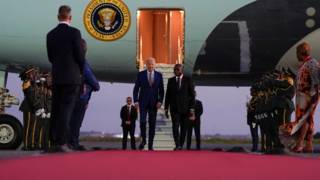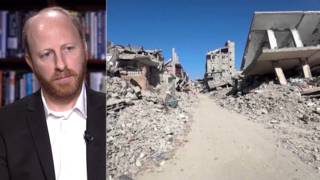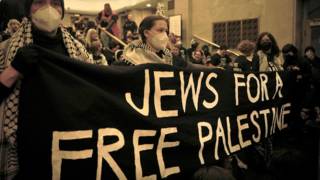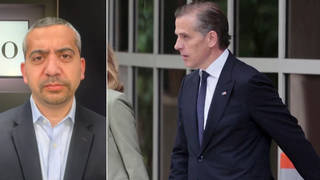Hi there,
There has never been a more urgent time for courageous, daily, independent news. Media is essential to the functioning of a democratic society. Today is Giving Tuesday, a day dedicated to supporting non-profits. Please make it Giving NewsDay by giving to this non-profit news organization. Thanks to a group of generous donors, all donations made today will be TRIPLED, which means your $15 gift is worth $45. With your contribution, we can continue to go to where the silence is, to bring you the voices of the silenced majority – those calling for peace in a time of war, demanding action on the climate catastrophe and advocating for racial and economic justice. Every dollar makes a difference. Thank you so much!
Democracy Now!
Amy Goodman
Hi there,
There has never been a more urgent time for courageous, daily, independent news. Media is essential to the functioning of a democratic society. Today is Giving Tuesday, a day dedicated to supporting non-profits. Please make it Giving NewsDay by giving to this non-profit news organization. Thanks to a group of generous donors, all donations made today will be TRIPLED, which means your $15 gift is worth $45. With your contribution, we can continue to go to where the silence is, to bring you the voices of the silenced majority – those calling for peace in a time of war, demanding action on the climate catastrophe and advocating for racial and economic justice. Every dollar makes a difference. Thank you so much!
Democracy Now!
Amy Goodman
Non-commercial news needs your support.
We rely on contributions from you, our viewers and listeners to do our work. If you visit us daily or weekly or even just once a month, now is a great time to make your monthly contribution.
Please do your part today.
HeadlinesFebruary 06, 2015
German, French Leaders Visit Kiev & Moscow in Push to Revive Ceasefire
The leaders of Germany and France are in Russia for talks on ending the renewed violence in eastern Ukraine and restoring a September ceasefire. German Chancellor Angela Merkel and French President François Hollande are meeting with Russian President Vladimir Putin in Moscow to discuss an initiative partially based on Kremlin proposals. Merkel spoke earlier today ahead of her trip to Russia.
German Chancellor Angela Merkel: “It is a question of peace and preserving the European peace order. It is a question of free self-determination of the people as part of this European peace order. And we are doing what we believe to be our duty at this time, namely trying to do everything in our power to end the bloodshed.”
Ukraine Demands Return to September Truce Terms; Top Officer Accused of Russia Spying
Merkel and Hollande met with Ukrainian President Petro Poroshenko in Kiev on Thursday. Dismissing rebel demands to account for recent territorial gains, Poroshenko called for a return to the ceasefire terms agreed to in September.
Ukrainian President Petro Poroshenko: “The Minsk plan is very simple: immediate ceasefire; releasing all the hostages; closing the border, or renew the internationally recognized border on Ukrainian (side); withdrawal all of the foreign troops from the Ukrainian territory; launching very important process of the political regulation by the election on the municipal election, local election, under Ukrainian legislation in the territory of Donetsk and Luhansk.”
On Thursday, the Ukraine government said it had arrested a senior military officer on charges of spying for Russia, raising new concerns about the infiltration of Ukraine forces.
Kerry: U.S. Nears Decision on Arming Ukraine Against Russian “Aggression”
The Obama administration continues to consider sending military aid to the Ukrainian government in Kiev, in what would be a major escalation of U.S. involvement. In meetings with Ukrainian leaders on Thursday, Secretary of State John Kerry accused Russia of “aggression” in eastern Ukraine, and said he expects a decision on U.S. military aid “soon.”
Secretary of State John Kerry: “We talked about the largest threat that Ukraine faces today, and that is Russia’s continued aggression in the east. There’s no other way to call it. We’re not seeking a conflict with Russia. No one is. … The president is reviewing all of his options. Among those options, obviously, is the possibility of providing defensive — defensive — assistance to Ukraine. And those discussions are going on. The president will make his decision, I am confident, soon.”
The weaponry under consideration includes antitank missiles, battlefield radars and reconnaissance drones.
White House Admits Concerns Arming Ukraine Could “Expand Bloodshed”
Speaking in Washington, White House Press Secretary Josh Earnest acknowledged internal concerns that sending weapons could worsen the crisis.
White House Press Secretary Josh Earnest: “One of the concerns that we have about providing military assistance is it does contain the possibility of actually expanding bloodshed. And that — that’s actually what we are trying to avoid. The whole reason that we are trying to encourage both sides to sit down and hammer out a diplomatic agreement is to end the bloodshed and end the escalating conflict in that — in that — in that country.”
Kremlin: U.S. Military Aid to Ukraine Would Threaten Russian Security
On Thursday, the Kremlin said the U.S. arming of Ukraine would threaten Russian security. German Chancellor Angela Merkel has opposed calls to send military aid to the Ukraine government in Kiev.
NATO Ministers OK Largest Collective Defensive Reinforcement Since End of Cold War
At a meeting in Belgium on Thursday, NATO defense ministers signed off on a plan to establish a network of command centers in eastern Europe and a large rapid reaction force to counter Russia. NATO Secretary General Jens Stoltenberg said the measures mark the alliance’s biggest reinforcement of collective defense since the end of the Cold War.
Jens Stoltenberg: “We decided on the immediate establishment of the first six multinational command and control units — in Bulgaria, Estonia, Latvia, Lithuania, Poland and Romania. If a crisis arises, they will ensure that national and NATO forces from across the alliance are able to act as one from the start. They will make rapid deployment easier, support planning for collective defense, and help coordinate training and exercises.”
Jordan Expands Anti-ISIS Strikes to Iraq After Pilot’s Killing
Jordan has intensified airstrikes on the Islamic State following the immolation of a captured Jordanian fighter pilot in Syria. Jordan says dozens of fighter jets struck ISIS sites on Thursday in Syria and, for the first time, in Iraq. Jordan has vowed to expand its role in the U.S.-led anti-ISIS coalition following the pilot’s death. Jordan’s announcement followed reports that the United Arab Emirates, a key coalition member, suspended its airstrikes in December over concerns for its pilots’ safety.
Scores Killed Around Damascus in Gov’t, Rebel Attacks
Scores of people were killed in and around the Syrian capital of Damascus on Thursday when rebels fired a barrage of rockets into several neighborhoods and government warplanes bombed opposition-held areas.
Greece, Germany Spar over Austerity as Syriza Gov’t Ends Europe Tour
Greece’s new finance minister has wrapped up his inaugural tour of Europe following the Syriza party’s historic election victory last month. Yanis Varoufakis visited European countries as part of his government’s push to roll back austerity and renegotiate Greece’s international bailout. On Thursday, Varoufakis was met with a chilly reception in Germany, Greece’s biggest creditor and the leading European backer of its austerity. At a news conference with German counterparts, Varoufakis made a direct appeal to German taxpayers.
Yanis Varoufakis: “My message to the average German hard-working taxpayer is that you have given us too much money in the last five years, not too little. Unfortunately, this was not an act of solidarity, although it was portrayed as one, to the Greek people. Ninety percent of that money never came to Greece. It was a cynical transfer of banking losses, initially onto the shoulders of the Greeks. Everybody knew that the shoulders of the Greeks were not strong enough to sustain that weight and that it will spill over to you. … We are coming here to begin for the first time a dialogue about how to minimize the cost of the Greek crisis to the average not only Greek, but also German, Slovak, Finn, Spaniard, Portuguese and so on and so forth, so as not to mention every member state of the eurozone.”
German Economy Minister Sigmar Gabriel countered Varoufakis by saying that Greece must be held responsible for its previous commitments.
Sigmar Gabriel: “Every country has the right to democratically elect a new government, and of course every government has the right to determine a new policy course, certainly if it has a clear mandate. But it must also be clear that the consequences, particularly the financial consequences, of a new direction in Greek policy cannot be transferred to other countries and financed by the taxpayers in these countries.”
Germany says it has offered Greece a contingent of 500 German tax collectors to help Athens recover taxes from wealthy citizens. The two sides say they have “agreed to disagree.”
Thousands Rally in Athens as Greek Prime Minister Vows to Reject Austerity “Orders”
In Athens, thousands of people rallied outside parliament Thursday in a show of support for the government’s anti-austerity campaign. In an address shortly after his own return from a European tour, Prime Minister Alexis Tsipras said Greece will not be bullied by its creditors.
Prime Minister Alexis Tsipras: “Greek democracy does not take orders, and certainly not through emails. Greece has a clear position. Greece has its own voice. Greece has its own negotiating strength. … It is our obligation and duty not to allow our citizens to be deceived once again. We are a sovereign country. We have a democracy. We have a program and an agreement with our people, and we have to honor this agreement.”
The European Central Bank has rejected Greece’s initial demands for help, tightening rules that will make it harder for Greek banks to obtain loans. Greece’s bailout with European and IMF creditors is due to expire at the end of the month.
IMF Grants $100 Million in Debt Relief to Ebola-Stricken Countries
The International Monetary Fund has granted partial debt relief to the three Western African countries worst hit by Ebola. IMF chief Christine Lagarde announced Guinea, Liberia and Sierra Leone will be reprieved of around $100 million in debt payments.
Christine Lagarde: “The IMF is giving debt relief to these three countries through the Catastrophe Containment and Relief Trust, which will provide grant aid used to relieve the debt for the next two years. … I have actually received already from one major donor a commitment to provide additional funding, and I hope that he will not be the only one, that there will be more that will follow suit.”
The $100 million figure amounts to about one-fourth of the total the three countries collectively owe. The joint debt is set to jump to $620 million over the next three years because of previously announced loans. In a statement, the group Jubilee Debt Campaign said: “Grants should be given to cope with the impact of Ebola, not more loans which leave an unjust debt to be repaid over the next decade.”
Obama Admin: Guantánamo Recidivism Has Declined
The Obama administration says the recidivism rate of Guantánamo Bay prisoners has fallen since President Obama took office. According to the White House, just six Guantánamo prisoners have engaged in militant activity after their release since 2009, for a rate of under 7 percent. The comparable rate under President George W. Bush was 19 percent. But even the lower new rate could be too high. According to Al Jazeera America, there has been only one case of a Guantánamo prisoner turning to militancy after release that can be independently confirmed. The groups CAGE and the Center for Constitutional Rights say they know of zero cases.
GOP Senator: More Prisoners Should Be Sent to “Rot in Guantánamo Bay”
At a Senate hearing this week, Republican Sen. Tom Cotton spoke out against President Obama’s call to close Guantánamo Bay, saying he believes the prison’s only problem is “too many empty cells.”
Rep. Tom Cotton: “In my opinion, the only problem with Guantánamo Bay is there are too many empty beds and cells there right now. We should be sending more terrorists there for further interrogation to keep this country safe. As far as I’m concerned, every last one of them can rot in hell. But as long as they don’t do that, then they can rot in Guantánamo Bay.”
2 Dead in Murder-Suicide at University of South Carolina
Two people are dead after an apparent murder-suicide at the University of South Carolina’s school of public health. One of the victims was a school professor. The campus was put on lockdown for about an hour on Thursday.
3 Democratic Lawmakers to Skip Netanyahu Speech
Three Democratic lawmakers have announced they will skip Israeli Prime Minister Benjamin Netanyahu’s upcoming speech to Congress on Iran. Congressmembers John Lewis, G.K. Butterfield and Earl Blumenauer say they oppose Netanyahu’s visit at a time when Washington seeks a nuclear deal with Iran. The trip has caused a major rift with the White House. On Thursday, House Minority Leader Nancy Pelosi said she hopes the address is canceled, but dismissed talk of a boycott.
Rep. Nancy Pelosi: “I’m seriously considering going. I mean, I am — as I said, as of now, it is my intention to go. It’s still my hope that the event will not take place. There’s a serious unease. But don’t even think in terms of the word boycott. Members will go, or they won’t go, as they usually go or don’t go.”
Pope Francis to Become 1st Pontiff to Address Joint Congressional Session
House Speaker John Boehner has announced another foreign guest who will address Congress this year. Pope Francis will become the first-ever pope to address a joint session of Congress when he visits the United States in September.
House Speaker John Boehner: “On September 24th, His Holiness Pope Francis will visit us here at the United States Capitol. That day, His Holiness will be the first pope in our history to address a joint session of Congress. We’re humbled that the Holy Father has accepted our invitation, and certainly look forward to receiving his message on behalf of the American people.”
Most popular
- 1
- 2
- 3
- 4
Non-commercial news needs your support
Please do your part today.











Media Options